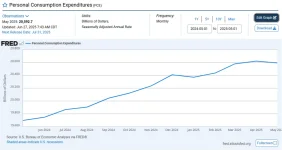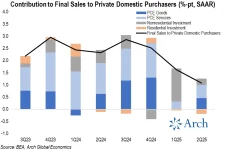Trump proved, back in 2018-2019 that tariffs do not necessarily increase inflation and the US has a LOT of room to grow manufacturing without increasing inflation.
To believe age old notions about the nature of inflation is to do a disservice to America.
And to put unsupported hopes before experience is to do a disservice to one's own brain - starting with making unsupported assumptions about the inflation rate proved anything in regards to a tariffs that only affected a few nations, primarily China, and were much smaller than those proposed (and some accepted) recently.
Besides, be reminded that the average inflation rate for the three years prior to Trump was 1.1 percent but after three years of Trump it rose to an average 2.1, that is until the COVID downturn of 2020.
Still, it is presumptuous to assume that the 1 percent increase in inflation was due to Trump's tariff policy (after all, he also increased deficit spending from his tax "cut" in the same period.) However, it is even more nonsensical to assume that these INCREASED numbers could mean that tariffs had no effect on inflation under Biden (who maintained the tariffs).
In sum, as everyone knows, whatever effects it had or may of had is washed out the tsunami consequences of both Covid and then the very reckless expansion of the money supply.
As for "old" ideas, perhaps you should read up on the history of economics, starting with Mercantilism. Here's a timeline of old to modern - showing who of us is actually dated:
15th–18th C. Mercantilism –
Trade surplus, bullionism, state control,
tariffs.
Figures: Thomas Mun, Colbert
Legacy: Colonialism, protectionism
(TRUMPER ECONOMICS)
18th C. Physiocracy – Agriculture as wealth, natural order
Figure: Quesnay
Legacy: First economic flow model
1776–Mid 19th C. Classical Economics – Free markets, labor theory of value
Figures:
Adam Smith, Ricardo,
JS Mills, Malthus
Legacy: Capitalism’s foundation
Mid–Late 19th C. Marxian Economics – Class struggle, surplus value
Figure: Karl Marx
Legacy: Socialist theory, critique of capitalism
1870–1930 Neoclassical Economics – Marginal utility, equilibrium
Figures: Jevons, Menger, Walras, Marshall
Legacy: Mathematical modeling, consumer focus
1930s–1970s Keynesian Economics – Aggregate demand, fiscal stimulus
Figure: J.M. Keynes
Legacy: Macroeconomics, welfare state
1970s–1990s Monetarism & New Classical – Money supply, rational expectations
Figures:
Stigler, Sowell,
Friedman,
Knight,
Lucas Legacy: Central bank independence
1980s–Present New Keynesian Economics – Sticky prices, DSGE models
Figures:
Mankiw, Blanchard,
Taylor,
Feldstein, Calvo
Legacy: Dominant macro framework in policy
I've bolded the conservatives and classical liberals associated with these developments who all uniformly rejected tariffs and TRUMPER's very arcane thinking.

econofact.org








